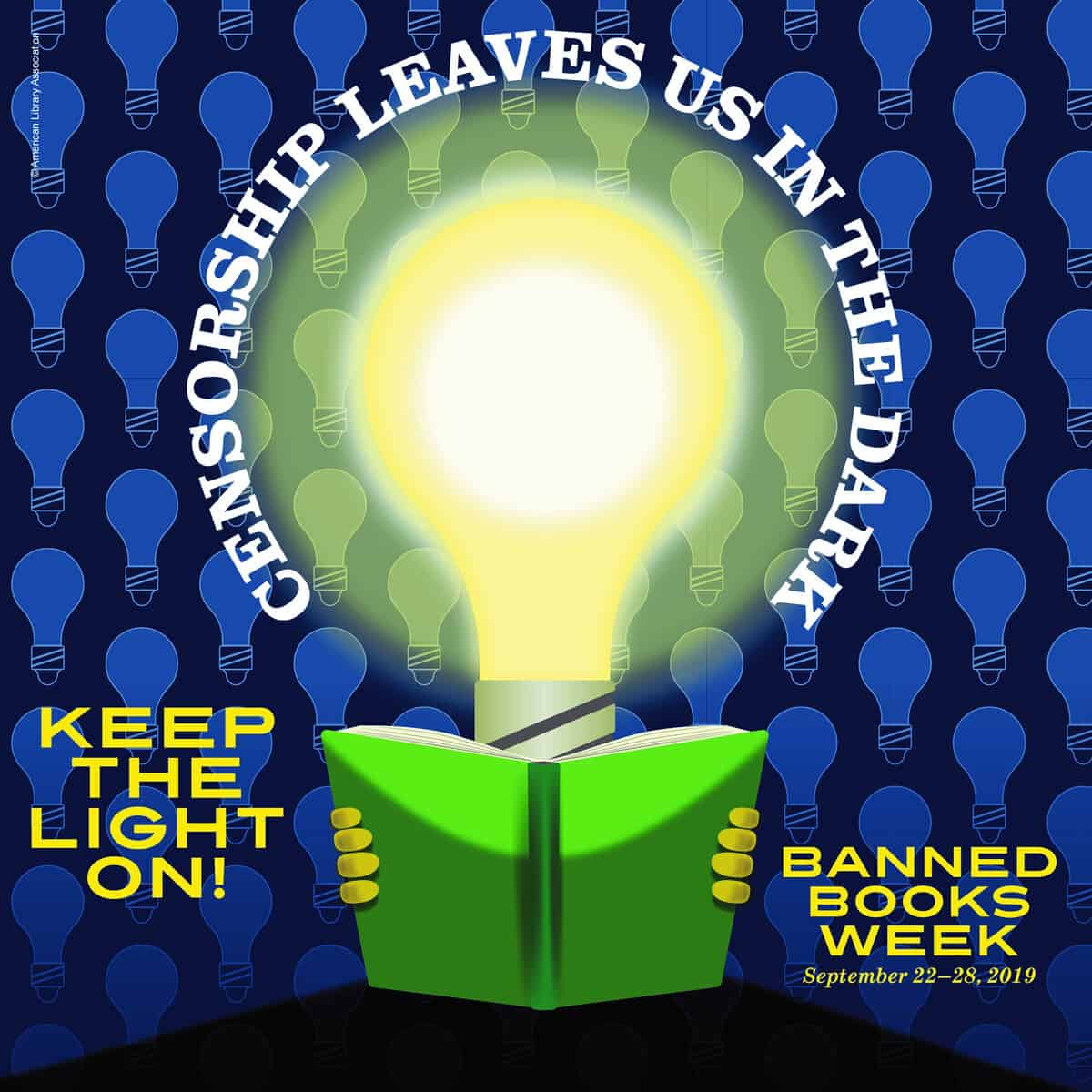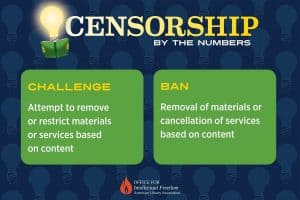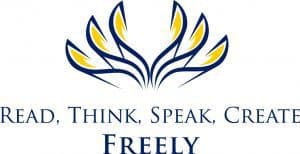Banned Book Week 2019
September 22-28, 2019
Banned Book Week, which was launched by the American Library Association (ALA) in 1982, “is an annual event celebrating the freedom to read.” Typically held the last week in September, Banned Book Week highlights the value of free and open access to information and the freedom to read. The Supreme Court case, Island Trees School District v. Pico (1982) ruled school officials can’t ban books in libraries because of their content.
You may have heard both the terms “challenged books,” and “banned books.” There is a difference, as the graphic (below) shows. A challenge is the attempt to remove or restrict materials, and a ban is the actual removal of the materials. Many books are challenged because they include (among other things) LGBTQIA+ content, transgendered characters, same-sex couples, profanity, violence, and religious viewpoints. ALA keeps track of books which are challenged and/or banned. However, ALA relies on voluntary challenge reports and media stories in order to track titles, therefore, the lists compiled are far from complete. Some surveys indicate the 82-97% of challenges go undocumented. Top 10 most challenged books going back to pre-1990s, are available on the ALA website. In 2018 the ALA Office for Intellectual Freedom tracked 347 challenges in library, school, and university materials. In 2018, two of the top 11 books challenged or banned two were challenged and burned. This Day in June by Gayle E. Pitman, illustrated by Kristyna Litten, and Two Boys Kissing by David Leviathan were both challenged and burned for including LGBTQIA+ content.
The good news is that in a majority of cases the books have remained available. This is due in part to the awareness that Banned Books Week brings to this issue!
New books are added every year – and some never make it off the list (Catcher in the Rye and To Kill a Mockingbird are two examples). Many of the banned books are novels, but a number of science books have also been challenged.
Many classic books have been banned. According to the Office for Intellectual Freedom, at least 46 of the Radcliffe Publishing Course Top 100 Novels of the 20th Century have been the target of ban attempts. See which books these are and learn the reasons for being banned at the following link: http://www.ala.org/bbooks/frequentlychallengedbooks/classics/reasons
Here are a few of the many books related to Engineering and Science that have been banned at one time or another:
- Any writing or discussion demonstrating the heliocentric nature of the universe was banned in 17th Century Europe.
- Writings by physicist and astronomer Galileo Galilei were banned and he was charged and convicted of heresy by the Inquisition in 1632 for writing, Dialogue Concerning the Two Chief World Systems.
- Books and teaching materials on Darwinian evolution theory, including The Illustrated Origin of Species by Charles Darwin were banned in schools in Tennessee following the Butler Act of 1925.
- The Menifee School District in California banned Merriam-Webster’s Collegiate Dictionary. It was banned for having definitions that were too explicit.
- The Golden Book of Chemistry Experiments, written in 1960 by Robert Brent and illustrated by Harry Lazarus was banned in the United States for being too accurate in its scientific initiative.
- Books and materials on Mendelian genetics have been banned from publication in Soviet-era USSR
If you are interested in exploring Leonardo da Vinci’s engineering works, check out Doing da Vinci. Four builders and engineers attempt to build never-before-constructed inventions! The 2-disc set looks at his armored tank, siege ladder, self-propelled carts and even a machine gun! Will his creations actually work? Doing da Vinci will show you!
We have many resources that relate to Darwin, Galileo, and da Vinci. Come explore our library and find these titles and more!
Resources:
Banned & Challenged Books. 2019. A Website of the ALA Office for Intellectual Freedom. American Library Association (ALA).
Top Ten Most Challenged Books List. 2019. A Website of the ALA Office for Intellectual Freedom. American Library Association (ALA).
Baron, Dennis. Webster’s banned for too much sex. Jan. 25, 2010. The Web of Language.
Other Resources:
25 Banned Books That You Should Read Today. March 2011. Learn.org
Chambers, Robert. 1846. Vestiges of the natural history of creation. E-Book available through The University of Iowa Libraries.
Scholz, Matthias Paul. 2007. Advanced NXT : the da Vinci inventions book. Berkeley, CA : Apress : New York : Distributed by Springer-Verlag. Engineering Library TJ211.15 .S36 2007
Letze, Otto, editor. 1997. Leonardo da Vinci : scientist, inventor, artist. Ostfildern-Ruit, Germany : Verlag Gerd Hatje : New York, NY : Distribution Art Publishers. Engineering Library N6923.L33 A4 1997
D’Onofrio, Mauro, Burigana, Carlo, editors. 2009. Question of modern cosmology : Galileo’s legacy. Berlin : Springer. Engineering Library QB981 .Q47 2009
Naess, Atle. 2005. Galileo Galilei, when the world stood still. Berlin : New York : Springer. Engineering Library QB36.C2 N2413 2005
Brasier, M.D. 2009. Darwin’s lost world : the hidden history of animal life. Oxford, NY : Oxford University Press. Engineering Library QE653 .B736 2009



